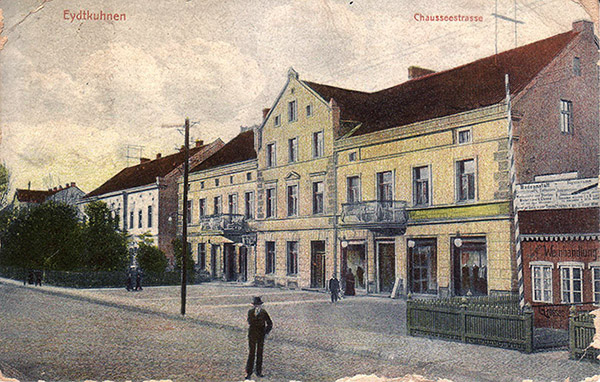East Prussian Eydtkuhnen
East Prussian Eydtkuhnen was once the last German town on the railway route from Germany to Russia. In fact, even before the Russian Empire was connected to Germany by rail, people traveled to Europe on horseback through Eydtkuhnen, since the road across East Prussia to Berlin began (or ended, depending on which side you look at it) here. In 1861, the railway from St. Petersburg reached Verzhbolovo, a border point on the Russian side, and a year earlier, Eydtkuhnen was connected to Königsberg. Due to the difference in track width between the Russian and German railways, travelers changed to the appropriate trains in Verzhbolovo and Eydtkuhnen and continued on their way.
Due to their "border location", both towns periodically experienced an influx of travelers. Signs on many shops, restaurants and hotels were bilingual. Both Russian and German customs were located here. In general, almost everything is the same as it is now. Only Eydtkuhnen has now turned from a German town into the Russian settlement of Chernyshevskoye, and Russian Verzhbolovo has become Lithuanian Virbalis.
Eydtkuhnen owes its “borderliness” to the fact that it was once one of the most frequently mentioned German cities. Eydtkuhnen was mentioned by Chekhov and Dostoevsky, Saltykov-Shchedrin and Ostrovsky, Mayakovsky and Nabokov.
Here, for example, is what Teffi writes about Eydtkunen in one of her stories:
"The most important moment of your border experiences is the presentation of your German ticket to the German guard on the Eydkuhnen platform. Raise your eyes and look at him. His nose is the color of a pigeon's wing, with purple streaks and small blue specks. Then you will immediately understand that everything is over for you, that your homeland is cut off from you and that you are alone and in a foreign land.
"Climb into the carriage quickly and write postcards."
So they "climbed" and wrote . It is clear that it was not only Russians and Germans who did this. An example of this is a postcard sent to the USA (although it was most likely written by a German)):
"Mrs. M Freeman
329 Bass Ave.
Detroit Michigan
North America
18 June 1908
I am now on the Russian Frontier ready to step over. In one of those houses I fell asleep at night. Hope things are all right. Good by
Karl»

"Pioneer" Carl tells a Mrs. Freeman in Detroit about his adventures on the "frontier" (here you can imagine Indians riding mustangs, Deadwood or Tombstone, Wild Bill Hickok, Wyatt Earp, Calamity Jane and other Custer generals):
"June 18, 1908
Now I'm at the Russian border, getting ready to cross it. I spent the night in one of these houses. I hope everything is fine."
